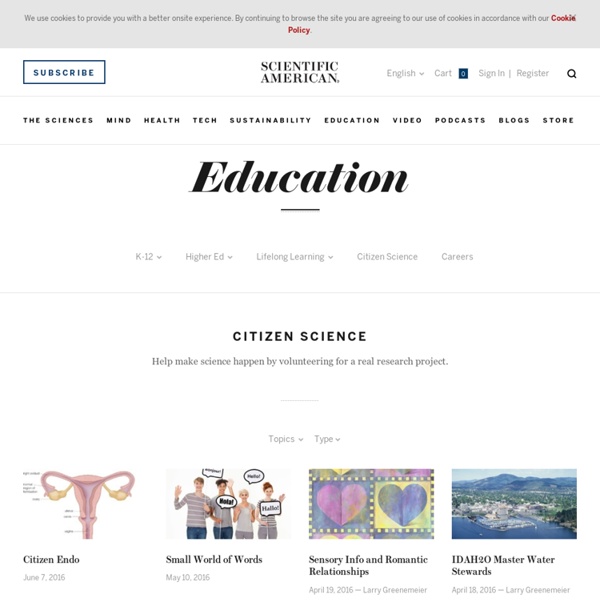



http://www.scientificamerican.com/citizen-science/
Citizen Science « CREW Land & Water Trust Image via Wikipedia Here you will find valuable resources related to CREW’s Strolling Science Seminars and citizen science. These resources are designed to help you learn more about the Strolling Science Seminar topics and to engage in a citizen science project of your own choosing. Rubrics for Teachers - Assessment A collection of rubrics for assessing portfolios, group work/cooperative learning, concept map, research process/ report, PowerPoint, oral presentation, web page, blog, wiki, and other social media projects. Quick Links to Rubrics Social Media Project Rubrics Wiki RubricCriteria for assessing individual and group Wiki contributions. Citizen Science Bioblitzes are gatherings of citizen scientists—and great introductions to citizen science itself! Just bring your smartphone and powers of observation to help catalog the natural wonders of urban parks and open space. Spearheaded by our friends at Nerds for Nature, bioblitzes are gatherings of scientists, citizen scientists, land managers, and more, all working together to find and identify as many different species as possible—everything from an ant to a redwood tree! Bioblitzes not only help land managers build a species list and atlas for their park, they also highlight the incredible biodiversity in these urban oases. Participants use the iNaturalist app to document their plant and animal observations, and we end each bioblitz with a “wrap session” that allows the group to see what everyone found and help each other with identifications.
Keep eLearning Real: 4 Basic Story Types to Link Learning to the Real-World Everybody loves a good story, even your (seemingly) staid and somber corporate learners. That's because, a child lurks inside all of us; he loves to peek into other people's lives and go with them on their journeys. Unconsciously, he tries to identify himself with the good guy in the story—the one who overcomes all challenges, bashes the baddies, and emerges as the hero in the end. Stories are captivating. The actions of the protagonist, who we can relate to, inspire us to think or act similarly. This is why, stories have been used throughout the ages to teach morals and values to children. Cyclone Center CycloneCenter.org is a web-based interface that enables the public to help analyze the intensities of past tropical cyclones around the globe. The global intensity record contains uncertainties caused by differences in analysis procedures around the world and through time. Patterns in storm imagery are best recognized by the human eye, so scientists are enlisting the public. Interested volunteers will be shown one of nearly 300,000 satellite images.
Today’s Education Should Be About Giving Learners Voice and Choice Some of the recurring themes of my conference presentations and blog posts include: The underlying theme of all of my ideas, of all of my blog posts is about setting up the conditions where learners’ choice and voice flourish. I have come to believe that the only real education is one that fully embraces learner choice and voice. Life After People The very notion is deliciously ghoulish: What happens to earth if - or when - people suddenly vanished? The History Channel presents a dramatic, fascinating what-if scenario, part science fiction and part true natural science. Welcome to Earth, Population: 0 is the catchy tagline, Life After People's 94 minutes are so gripping you nearly forget while you watch that you, yourself, will be gone too. It turns out that earth can go along very nicely without us. The hardest part of the special is probably in the first 15 minutes, when pet owners confront what likely will happen to their dogs (thankfully, the show follows those dogs who break out of their houses, and the prognosis for them to survive as scavengers is good). As the fictional days and weeks tick by, the process of nature's reclaiming the planet becomes less grim and more fascinating.
Anthropocene The Anthropocene is an informal geologic chronological term that marks the evidence and extent of human activities that have had a significant global impact on the Earth's ecosystems. The term was coined in the 1980s[1] by ecologist Eugene F. Stoermer and has been widely popularized by the Nobel Prize-winning atmospheric chemist, Paul Crutzen, who regards the influence of human behavior on the Earth's atmosphere in recent centuries as so significant as to constitute a new geological epoch for its lithosphere.
Rights Rights are legal, social, or ethical principles of freedom or entitlement; that is, rights are the fundamental normative rules about what is allowed of people or owed to people, according to some legal system, social convention, or ethical theory.[1] Rights are of essential importance in such disciplines as law and ethics, especially theories of justice and deontology. Rights are often considered fundamental to civilization, being regarded as established pillars of society and culture,[2] and the history of social conflicts can be found in the history of each right and its development. According to the Stanford Encyclopedia of Philosophy, "rights structure the form of governments, the content of laws, and the shape of morality as it is currently perceived
Nature Nature, in the broadest sense, is equivalent to the natural, physical, or material world or universe. "Nature" refers to the phenomena of the physical world, and also to life in general. It ranges in scale from the subatomic to the cosmic. The study of nature is a large part of science. Although humans are part of nature, human activity is often understood as a separate category from other natural phenomena.
rights of mother earth IMMEDIATE RELEASE CONTACT: Robin R. Milam1.530.272.4322/Nature@TheRightsofNature.org The world’s first Tribunal on the Rights of Nature is being held in Quito, Ecuador, today.